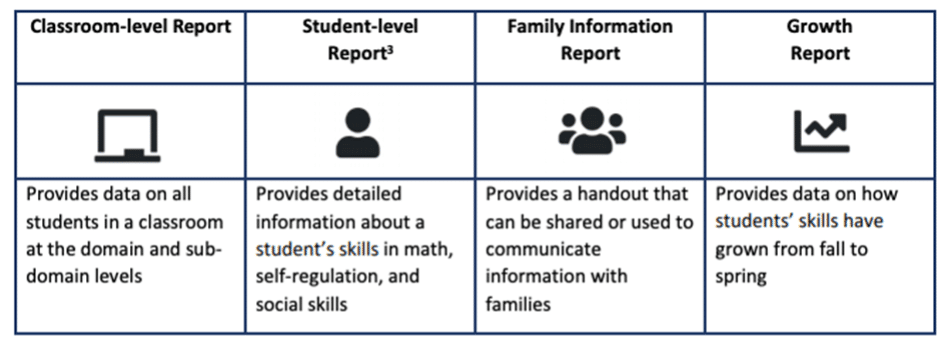Have a Look! Kindergarten and Pre-K Reports

If you are a public Pre-K or Kindergarten teacher in Virginia, chances are you’re in the midst of assessing your students using PALS and VKRP. Soon you’ll be reviewing reports that provide data that can be used in combination with other information collected to better understand the needs of students at the end of the school-year. These data can help steer instruction and interactions, aid in early intervention referrals, and provide data that can be used to identify inequities in students’ outcomes.
VKRP Contains Four Different Types of Reports

The Classroom Overview shows you, at a glance, how students scored on each of the assessments. There is also a summary table that provides information about class averages and ranges.
A Student Overview report is available for each student in your class. This report shows a student’s individual scores on the domains, including information about the well-being items on the CBRS and mathematics subdomain scores (Geometry, Patterning, Numeracy, Computation).
Growth Reports are available for mathematics, self-regulation, and social skills and show data on students’ fall and spring scores charted side-by-side. The Growth Reports give you a sense of students’ skill development from fall to spring.
There are some key differences between Kindergarten and Pre-K reports. In the next section of this blog, we’ll discuss key differences, and how to interpret reports.
Kindergarten Reports
Kindergarten reports include benchmarks. Benchmarks for the mathematics (EMAS), self-regulation, and social skills (CBRS) assessments were established using developmental expectations in conjunction with data collected across the Commonwealth over the 2015-2019 pilot phase. Students scoring below the benchmark on a specific assessment (i.e., EMAS, CBRS – Self-Regulation (SR) subscale, or CBRS – Social Skills (SS) subscale) most likely need extra support in that area. More detailed information about the benchmarks can be found in the Kindergarten Interpreting Reports document.

There are two important things to remember about the benchmarks:
- Benchmarks for the mathematics (EMAS), self-regulation, and social skills (CBRS) assessments were established using developmental expectations in conjunction with data collected across the Commonwealth over the 2015-2019 pilot phase.
- Teachers should also closely monitor students falling just above the benchmark.
- And, for all students, continual progress monitoring is critical as students develop skills at different rates and respond differently to instruction and scaffolding.
Pre-K Reports
The Pre-K reports do not currently include benchmarks. To help teachers interpret and use Pre-K data, we provide score ranges identifying children in three categories: On Track, Monitoring, and Support. These score ranges are included to provide guidance on where children are in their development of skills so that teachers can provide appropriate support and instruction. For children in all categories, we recommend continual progress monitoring and formative assessment to understand how children’s skills are growing. For many children, Pre-K is their first formal learning experience, while others have attended preschool. Therefore, Pre-K children naturally start and end the school year with great variation in their skills. More detailed information about the benchmarks can be found in the Pre-K Interpreting Reports document.
Pre-K Score Range Descriptions:
- Children in the Support range have emerging skills in one or more early learning domains. They may continue to need extra support as they work to reach kindergarten readiness.
- Children in the Monitoring range are building their skills in one or more domains. Typical classroom supports and ongoing monitoring will help these children develop strong early learning skills.
- Children in the On Track range have strong foundational skills in one or more domains. These students may need extra challenge to stay engaged.

We also value your feedback! We have been collecting teacher, administrator, and family feedback about Pre-K reports this spring and will be incorporating those recommendations into the Pre-K reports this fall.
In summary, VKRP is not just a set of assessments. It is also a reporting system that provides a detailed snapshot of students’ strengths and areas for potential growth in the fall and spring. These reports provide detailed, actionable information to assist teachers, leaders, policy makers, and others to work towards providing each and every child with equitable opportunities and resources to succeed in school. You can access the reports highlighted above, as well as many others, on the VKRP webportal. Remember, the Interpreting Spring VKRP reports for Pre-K and Kindergarten includes detailed information about all of the available report information!
More questions? VKRP provides support via the online chat feature when you are in the system, via email vkrp@virginia.edu, and via toll free 866-301-8278 ext. 1

